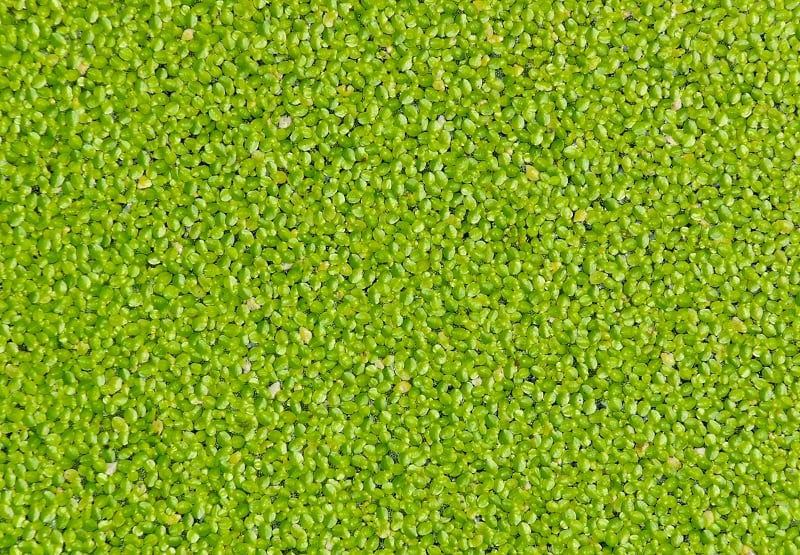People eating a plant-based diet are recommended supplements, including B12, in order to fill some key nutritional gaps. B12 is naturally found in animal products including milk, cheese and eggs.
Although some fortified breakfast cereals are good sources of B12, it is not found naturally in foods such as fruit, vegetables and grains. Meanwhile, the most common supplemental form of B12 is synthetic, possibly a concern among consumers. A plant-based source of B12 is therefore potentially hugely significant.
Duckweed, or water lentils, is a family of small flowing plants that float on the surface of ponds and lakes, similar to water lilies. Duckweed is being grown on large aquafarms by companies such as Parabel. This firm, based in Vero Beach, Florida, grows and processes water lentils into plant protein powder called Lentein.
Parabel claims independent tests have confirmed its water lentil crop contains high levels of natural bioactive vitamin B12. The company said it has completed five independent, third-party vitamin B12 tests using the microbial testing method to quantify the amount present in a 100-gram sample.
According to Parabel, this method has been used in previous studies to determine vitamin B12 quantity. The company has also completed a Liquid Chromatography Tandem Mass Spectrometry (LC-MSMS) method on the water lentil crop, which it says is more precise and accurate than the traditional microbiological method, and one that is able to distinguish and quantify between each of the four bioactive forms of cobalamin.
It said the studies revealed its water lentil crop to contain the natural bioactive forms of vitamin B12 adenosylcobalamin, methycobalamin, and hydroxocobalamin. It added that its water lentil protein contain levels of vitamin B12 at 0.53 mcg/24g, which represents 22% of the daily recommend level in the US. The tests, said the company, were analysed and confirmed by independent third-party laboratory Eurofins Craft Technologies.
‘Potentially game changing’
Parabel will continue to test and analyse duckweed’s B12 credentials. Duckweed enthusiasts, meanwhile, claim this underused and protein-rich plant has serious potential in the health and wellness market as a nourishing and sustainable food ingredient.
Mark Driscoll, founder and director of the consultancy Tasting the Future, said the US discovery ‘could potentially be quite a game changer’.
“From a sustainability point of view it's quite an exciting development. Duckweed is full of other micronutrients. They taste like sweeter lentils, are highly nutritious and packed with Omega acids and fibres. They can double their biomass every 24 hours.”
According to Driscoll, duckweed is one of the many ‘orphan, forgotten or underused’ crops up to now largely ignored by major research organisations that food businesses are starting to explore in the name of sustainability and health. There are 20,000 species of edible plants in the world yet 75% of the global food supply comes from only 12 plant and five animal species, dominated by rice, maize and wheat.
‘A scalable option for the exploding plant-based movement’
In addition to vitamin B12, the water lentil has been referred to as the world's most complete food source as a result of its high levels and quality of protein, vitamins and minerals in the plant. The fact that the water lentil crop can double its biomass in a matter of days, could potentially lead to high yields and a scalable option for ‘the exploding plant-based movement,’ claimed Parabel.
"Parabel's hydroponic systems represent a scalable and potentially revolutionary platform to produce highly nutritious plant foods that contain bioactive vitamin B12 forms,” said Dr. Matthew Van Ert, Parabel's Chief Scientific Officer. “Along with partners, we will begin conducting bioavailability studies to determine the effectiveness of water lentils as a natural, plant-based solution to address vitamin B12 deficiencies."
The evidence from Parabel was enough to convince Geoff Palmer, a vegan ‘influencer’ and the CEO and owner of Clean Machine, a natural and plant-based sports and nutrition supplement company.
He commented: "I have reviewed the testing and I feel confident that the Parabel team has identified bioactive vitamin B12 in their products. This could be a game changing event for the plant-based food community as it allows one to consume bioactive, natural, whole food plant-sourced B12.”


